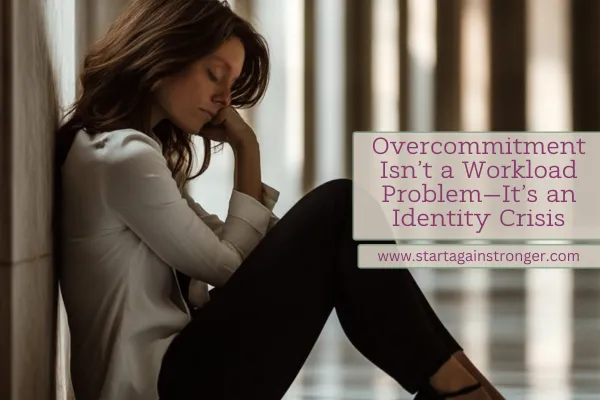
Overcommitment Isn’t a Workload Problem—It’s an Identity Crisis
🎧 Prefer to listen?
In this 1-minute audio, I share how I learned—firsthand—that overcommitment has nothing to do with planners or productivity tools… and everything to do with how we define ourselves.
We live in a culture that equates value with velocity. Output is rewarded, hustle is applauded, and high performers are praised for juggling nonstop priorities.
It’s no surprise that overcommitment has become a status symbol—especially among ambitious professionals. But what if the real reason you feel overwhelmed has nothing to do with how much you’re doing?
Here’s the truth:
Overcommitment isn’t a workload problem.
It’s an identity crisis.
What If Your To-Do List Isn’t the Real Problem?
If you’re a high performer, chances are you’ve mastered time management.
You know how to:
Color-code your calendar
Time-block with precision
Stack your commitments efficiently
And still… you say yes to things that drain you. Why?
Because for many high-achievers, commitments are tied to identity, not energy. You’re not just managing tasks—you’re upholding a persona:
The dependable one
The team player
The overachiever who never drops the ball
The helper who keeps the peace
You're not checking boxes.
You're protecting who you think you need to be.
Why High Performers Say Yes When They Should Say No
Overcommitment is often driven by fear—not logic:
Fear of disappointing others
Fear of being perceived as difficult
Fear of losing opportunities, respect, or approval
That fear hijacks your nervous system.
It overrides clarity with urgency.
You start reacting from pressure instead of purpose.
You build a life of constant motion—but minimal meaning.
This isn’t a time management issue.
It’s a nervous system issue.
It’s a self-concept issue.
The True Cost of an Overcommitted Identity
In my 15+ years of coaching high-achieving professionals, I’ve seen this pattern take a real toll.
When your identity is built on being “the one who always shows up,” you end up:
Resentful—but afraid to disappoint
Burned out—but unwilling to slow down
Out of alignment—but still overdelivering
And the more you perform a version of yourself that isn't authentic,
the more your clarity, confidence, and purpose begin to erode.
What To Do Instead
The opposite of overcommitment isn’t laziness.
It’s identity alignment.
Start here:
1. Reflect on the Role You're Playing
Ask: Who do I believe I need to be to succeed?
Then ask: Is that truly me—or is that survival mode speaking?
2. Watch for Nervous System Hijacks
Urgency, guilt, and anxiety are cues to pause—not act.
Try nervous system regulation tools like the Triple Warmer Smoothie to bring your energy back to center before making decisions.
3. Audit Your Commitments
Look at your calendar. Ask yourself:
Which commitments reflect my values?
Which reflect my fears?
The Bottom Line
You don’t need better productivity apps.
You need better alignment with who you really are.
Because when you lead from your true identity—not the identity you perform under pressure—you experience:
More clarity
More calm
More fulfillment
And that’s the kind of leadership the world needs.
Curious what energetic patterns are driving your overcommitment?
👉Get your free Human Design report here.
🔍 Frequently Asked Questions
Q: How do I know if I’m overcommitted because of identity—not just overbooked?
If you’re chronically saying yes out of guilt, fear, or pressure—and feel drained even when everything looks “successful”—you’re likely in an identity trap, not just a scheduling crunch.
Q: What if I can’t stop saying yes? People depend on me.
This is common for high performers. Learning to regulate your nervous system and clarify your core identity gives you back the power to say yes from alignment—not from fear.
Q: Is there a tool to help me get started?
Yes. Start with two tools:
The Triple Warmer Smoothie for nervous system regulation
A Calendar + Values Audit to track identity-driven commitments
You can also get your free Human Design report to pinpoint your unique energetic pressure points.
Q: Is this what your coaching program helps with?
Absolutely. My private coaching is designed to help high performers like you stop over-functioning and start leading from self-trust, not survival.
👉 Book a free strategy session and let’s talk about what it looks like to start again stronger.
